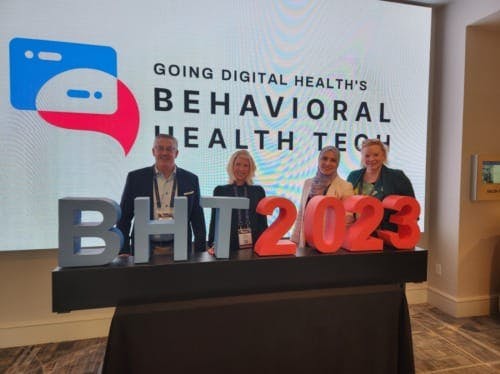Surprising Insights About Senior Mental Health From Cigna, Humana, and Optum

Supportiv CEO Helena Plater-Zyberk had the honor of moderating a recent Behavioral Health Tech panel entitled “Tech-Forward Seniors: Embracing Digital Mental Health Solutions for Aging Populations.”
The session addressed how panelists Marlo Murray (Senior Manager, Product Strategy, Medicare, Cigna), Abeer Jaber, MBA (VP, Integrated BH Clinical Operations, Optum Health), and Michael Tilton (SVP, Senior and Retiree Solutions, Humana) strategize to engage older people with behavioral healthcare.

As panelist Abeer Jaber reiterates, seniors are not a monolith. People in this population group span large differences in age, health conditions, socioeconomic status, and life setting (whether living alone, with family, or in an institutional community). That said, there are some population-wide insights relevant to behavioral health engagement for seniors.
These surprising points may influence how we proactively engage with aging individuals:
Seniors are less lonely than other populations, particularly Gen Z.
That’s not to say that addressing senior loneliness is not a top priority; there are proven linkages between loneliness, depression, and the severity of chronic health conditions. Keeping seniors vital means keeping them connected.
There is an economic case for prevention in aging populations.
Why address this population’s mental and emotional health needs early and preventively? Emotional comorbidities lead to 2-3X the cost of care, compared to members without mental health conditions. Keeping seniors engaged with BH care not only reduces those comorbidities, but allows for earlier intervention as new problems arise.
Regular mental health channels don’t effectively engage Medicare members.
Only 10% of the Medicare Advantage population uses their behavioral health benefits (even though 40%+ receive a diagnosis from their PCP).
Members trust their primary care doctors for mental health services more than behavioral health providers. Visiting a primary care provider rather than a therapist may allow seniors to talk through struggles without feeling labeled as “having a mental health issue.”
Priority: destigmatizing mental health for seniors.
Going forward, one major key in serving this population will be getting around behavioral health stigma. Digital solutions (like Supportiv) may be able to leverage this point by providing destigmatized, easy-access care to seniors.
Read more on how Supportiv uses these Medicare population insights to provide peer-to-peer mental, emotional, and social support services to the senior population.
Contact Us
For anonymous peer-to-peer support, try a chat.
For organizations, use this form or email us at info@supportiv.com. Our team will be happy to assist you!

